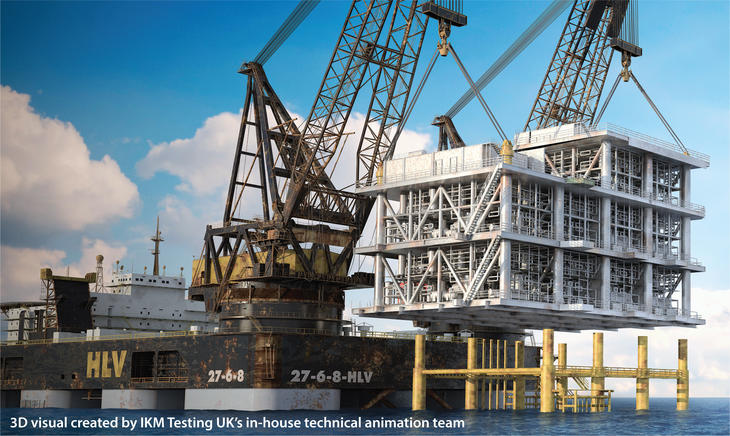IKM Testing is a subsidiary of the Stavanger-headquartered IKM Group. And whilst testing services are traditionally at the core of what it does, the Aberdeen-based business offers a wide range of additional services: including all those related to pre-commissioning and commissioning of pipeline systems; well services; valve management, supply, and repair; client technical and operational training; and 3D technical animation.
In other words, despite the name, IKM Testing does not deal exclusively in testing, and in fact has a considerable track record in decommissioning activity. Reflecting that, it appointed Glen Littlejohn as its Decommissioning Focal Point in early 2018 to underpin the company’s commitment to “looking at decom with a capital ‘D’…
An Analytical Mindset
![]() “I was appointed with the clear objective of really strategising our decommissioning service and, as an engineer by profession, this meant beginning with analysis! Like many companies, whilst IKM Testing had been involved in decommissioning in the past, we hadn’t necessarily developed and articulated what our specific Decommissioning offering was or, perhaps more importantly, what it could be. The first step we took was to identify everything we’d done previously in relation to decommissioning, and plot that against a matrix which we derived from Decom North Sea’s Work Breakdown Structure. Thereafter, using validated industry data, we could plot our course with confidence.
“I was appointed with the clear objective of really strategising our decommissioning service and, as an engineer by profession, this meant beginning with analysis! Like many companies, whilst IKM Testing had been involved in decommissioning in the past, we hadn’t necessarily developed and articulated what our specific Decommissioning offering was or, perhaps more importantly, what it could be. The first step we took was to identify everything we’d done previously in relation to decommissioning, and plot that against a matrix which we derived from Decom North Sea’s Work Breakdown Structure. Thereafter, using validated industry data, we could plot our course with confidence.
“That initial profiling of sector performance and capability was hugely influential in how we set about ‘understanding the prize’, as well as creating a robust strategy for developing our future decommissioning business - the availability of market data to analyse was fundamental to this.
“I think that, in the post-downturn era, an analytical approach to business development is so important in achieving the efficiency we’re all striving for. For that to work, the flow of reliable market data must be maintained – especially so in the decommissioning sector.”
The Human Factor
“However, our approach to the decommissioning sector isn’t as impersonal as all of that may sound. Effective and relevant relationships with operators and our supply chain colleagues are essential to validating the market, and to understanding how we can all help to achieve the OGA’s targets.
“Bill Cattanach, the OGA’s Head of Supply Chain has previously called for more collaborative decommissioning contacting models, saying that it’s vital for the transparency required to deliver the 35% cost reduction target, and I couldn’t agree more.
“However, I’m fully aware that “collaboration” is in danger of becoming an over-used term in this sector, so perhaps “front end relationship building” is a better way of describing the process we encourage and adhere to. We look to have meaningful conversations with our clients from the outset – sometimes a year ahead of a tendering process. Open discussions, honestly setting expectations – these are all challenges for an industry traditionally more reserved in this respect, but it does represent a simple, achievable step on the pathway to assuring an efficient decommissioning sector.”
A New Way of Working
“It’s generally accepted across the oil and gas industry that a successful late-life and decommissioning sector needs to work differently – and I believe there is a real willingness to achieve this. Looking ahead to a North Sea industry where there are smaller, leaner, more dynamic operators in play – my hope is that collaborative, non-hierarchical project models such as those now emerging will become the norm.

“For example, an ongoing contracting model saw IKM Testing embedded within a complementary group of contractors at FEED stage. We had clear understanding of what was important to the operator, as well as the broader contracting group in line with the SCAP objectives – and they had clear sight of what factors would enable us to realise efficiency on their behalf. One of the more tangible results of this has been significantly streamlined commercial processes, and a high degree of early-stage scope accuracy.
“Everything about that project is based upon gaining predictability and capping commercial exposure. We are, in effect, in charge of our own destiny too: we are, of course, comfortable to have our performance assessed objectively, and we know that high performance will yield the continuity we all want.
“I think that this all perhaps points to some future of an efficient, effective decommissioning sector, which will rely upon access to market intelligence, open lines of communication between operator and supply chain communities, and a willingness to “tune up the machine” throughout the process.”